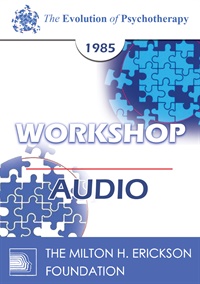EP85 Workshop 18 - Brief Therapeutic Interventions - Paul Watzlawick, PhD
- Average Rating:
- Not yet rated
- Topic Areas:
- Workshops | Brief Therapy | Psychotherapy | Strategic Therapy | Systems Theory
- Categories:
- Evolution of Psychotherapy | Evolution of Psychotherapy 1985 | Pioneers in Couples and Family Therapy
- Faculty:
- Paul Watzlawick, PhD
- Course Levels:
- Master Degree or Higher in Health-Related Field
- Duration:
- 2:36:19
- Format:
- Audio Only
- Original Program Date:
- Dec 13, 1985
- License:
- Never Expires.
Description
Description: This session introduces the core principles of MRI’s brief therapy model, focusing on how small, specific behavioral interventions can disrupt entrenched patterns and promote change. Drawing on videotaped case material, the presentation explores direct prescriptions, paradoxical strategies, and positive reframing. Through clinical examples—ranging from perfectionism to family conflict—the session shows how symptoms often serve as solutions to deeper issues, and how shifting perspective can open new paths forward.
Syllabus Desctiption: An introduction to the brief therapy techniques developed at Mental Research Institute; sound and videotaped examples of such interventions from actual therapy sessions.
Educational Objectives:
- To list three major categories of therapeutic interventions, with special attention to the patient's resistance to change
- To describe the difference between the indicative language (the language of description, interpretation, etc.) used in traditional therapy, and the injunctive, performative language applied in behavior prescriptions
*Sessions may be edited for content and to preserve confidentiality*
Credits
Faculty

Paul Watzlawick, PhD Related Seminars and Products
Paul Watzlawick, received his Ph.D. from the University of Venice in 1949. He has an Analyst's Diploma from the C.G. Jung Institute for Analytic Psychology in Zurich. Watzlawick has practiced psychotherapy for more than 30 years. He was research associate and principal investigator at the Mental Research Institute. He was Clinical Professor at the Department of Psychiatry and Behavioral Sciences, Stanford University Medical Center. Watzlawick is a noted family therapist; he is recipient of the Distinguished Achievement Award from the American Family Therapy Association. Also, he is author, co-author or editor of eight books on the topics of interactional psychotherapy, human communication and constructivist philosophy.
He formulated five axioms. They are:
- It is not possible to not communicate. Every behavior is some kind of non-verbal communication.
- Every communication has a content. In addition, there is 'metainformation', which says how the communicator wants to be understood.
- All partners involved in a communication process also interpret their own behaviour during communication.
- Human communication involves both verbal and non-verbal communication. In addition to the spoken words, there are is also a non-spoken part (gestures, behavior, intonation..) which is part of the communication.
- Communication between humans is either symmetric or complementary. This is based on whether the relationship of those communicating is based on differences or parity.


